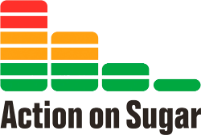What are sugars
Free sugars
Free sugars are defined as the type of sugars that are added to food, as well as sugars that are naturally present in honey, syrups and fruit juices, not sugars in milk products and whole fruit & vegetables.
Fruit juices
Fruit juices are a significant source of free sugars, and contribute between 10-14% of free sugars consumption by children. Processing juices excludes fibre, which concentrates the free sugars (fructose, sucrose and glucose), which speeds up their absorption in the body. For example 11 oranges can be squeezed into 900ml of juice and can contain 10-15g of free sugars per 150ml. Government advice is that one 150ml serving of any fruit juice counts towards one of your five a day servings (anything over 150ml does not count). We are calling for fruit juice to be removed from the recommended 5 portions of fruit and vegetable a day list, because of their high sugars content.
Smoothies
The amount of free sugars in a smoothie depends upon the ingredients and processing techniques, however we are concerned with the level of sugars. Unlike juices which are collected by squeezing, smoothies blend fruit (or vegetables) resulting in a thicker liquid. The amount of fibre contained in a smoothie depends on the intensiveness of the processing method, whether the skin of the fruit was included and whether fruit juices are also added. For a smoothie to be considered as 2 portions of a 5-a-day it must contain:
- at least 80g of one variety of whole fruit and/or vegetable and at least 150ml of a different variety of 100% fruit and/or vegetable juice, or
- a minimum of 80g of one variety of whole fruit and/or vegetable and at least 80g of another variety of whole fruit and/or vegetable.


